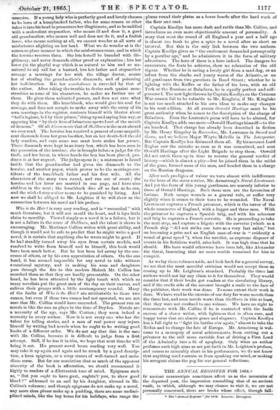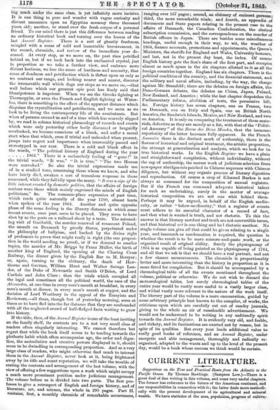THE ANNUAL REGISTER FOR 1864.* Ir ancient manuscripts sometimes affect
us as the mummies of the departed past, the impression resembling that of an ancient vault, in twhich, although we may chance to visit it, we are not personally concerned, there are books whose effect, though fall-
• Me'. domed Replotor " for lea. London: 'Wanton.
lug midi under-the same class, is yet infinitely more incisive. It is one thing to pore and wonder with vague curiosity and distant unconcern upon an Egyptian mummy three thousand years old ; another, to stand over the fresh corpse of a personal friend. To our mind there is just this difference between reading an ordinary historical book and turning over the leaves of the last Annual Register. There is a sort of ghastly freshness, mingled with a sense of cold and immutable bereavement, in the record, chronicle, and review of the immediate year de- ceased. At every step, as we move on, the past rises petrified behind us, but if we look back into the enchanted crystal, just in proportion as we take a further view, and embrace more distant horizons, we lose the sense of hardness and necessity, that sense of deadness and petrifaction which is thenst upon us only as we contract our range, and looking nearer and nearer, discover the irremovable wall which dogs our steps as we move on,—that wall before which our greatest epic poet has finely said that Omnipotence is impotent. When we see the Greeks fighting at Thermopylae, or even the French and English fighting at Water- loo, there is something in the effect of the apparent distance which disguises the crystallization and petrifaction, and we seem as we look to be living the contemporary life of the combatants. But when of persons around us and of a time which has scarcely slipped by, we read in solemn historical phraseology of records and events which were only yesterday either hotly discussed or languidly overlooked, we become conscious of a blank, and suffer a moral start when that which, even if trivial and unheeded when present, jumps into regret and importance when irrevocably passed and stereotyped in our rear. There is a cold and blank effect in the words, " The political history of England during the year
1864." There is a melancholy feeling of " gone !" in the trivial words, "It was," "It is true," "The two Houses were convoked." So also the trivial expressions made use of in a studied tone, concerning those whom we knew, and who have lately died, awaken a sort of tremulous response in those concerned, while they fall idly upon the many. " It was a sign of the little interest created by domestic politics, that the affairs of foreign nations were those which mainly engrossed the minds of English politicians," &c. The common-place expression of past time, which reads quite naturally of the year 1700, almost hurts when spoken of the year 1864. Another and quite opposite phase of the same feeling is the illusory distance at which some recent events, once past, seem to be placed. They seem to have shot by as the posts on a railroad shoot by a train. The astound- ing visit of Garibaldi, the murder renewed of renascent Poland, the assault on Denmark by greedy States, perpetrated under the philosophy of bullyism, and backed by the divine right of professors to prove that might really is right (the one proposi- tion in the world needing no proof), or if we descend to smaller topics, the murder of Mr. Briggs by Franz Muller, the birth of another king of England, the opening of the Charing Cross Railway, the dinner given by the English Bar to M. Berryer ; or, again, turning to the obituary, the death of Haw- thorne and Grattan, William Hunt and Walter Savage Lan- dor, of the Duke of Newcastle and Smith O'Brien, of Lord Carlisle and John Clare ; then the trials which occupied all the legal and sometimes all the political world, the case of the Alexandra, at one time in every man's mouth at breakfast, in every man's mouth at dinner, in every man's mouth at supper, and the decision of Lord Westbury in the appeal of the Essayists and .Reviewers,—all these, though but of yesterday morning, seem at times so to have fled into the far distance that they are confounded with all the neglected crowd of half-fledged facts waiting to grow into history.
If the title, then, of the Annual Register is one of the least inviting on the family shelf, its contents are to a not very small class of readers often singularly interesting. We cannot therefore but regret that while the book itself seems to be tending towards the plethoric habit which often accompanies age, the order and diges- tion, the assimilative and creative powers displayed in it, should seem to be dwindling in corresponding proportion. And as a very large class of readers, who might otherwise find much to interest them in the Annual Register, never look at it, being frightened away by its title and scant reputation, we will take the trouble of stating the contents and arrangement of the last volume, with the view of offering a few suggestions upon a work which might occupy a much more prominent position under judicious management. The volume before us is divided into two parts. The first pro- fesses to give a retrospect of English and foreign history, and of literature, art, and science, the whole in 295 pages. Part IL contains, first, a monthly chronicle of remarkable occurrences,
ranging over 167 pages ; second, an obituary of eminent persons; third, the more remarkable trials ; and fourth, an appendix of documents and State papers relating in the present case to the affairs of Denmark, the Canadian Confederation, the clerical subscription commission, and the correspondence on the murder of British officers in Japan. There are besides some miscellaneous headings, useful enough in their way, to wit, the weather of 1864, finance accounts, promotions and appointments, the Queen's Ministers, the sheriffs for England and Wales, University honours, and last, not in the present day least, the index. Of course English history gets the lion's share of the first part, and occupies almost as much space in the six chapters allotted to it as all the foreign countries together. England has six chapters. There is the political condition of the country, and the financial statement, and the military and naval affairs, including, by the way, the charge against Mr. Stansfeld ; there are the debates on foreign affairs, the Dano-German debates, the debates on China, Japan, Poland, New Zealand, and America ; while the last chapter despatches the Parliamentary reform, abolition of tests, the permissive bill, &c. Foreign history has seven chapters, one on France, two on Denmark, one on Italy and Spain, one on British North America, the Sandwich Islands, Mexico, and New Zealand, and two on America. It is only on comparing the treatment of these mate- rials, defective as they are merely as a list, with that of the "Politi- cal Annuary " of the Revue des Dux Mendes, that the immense superiority of the latter becomes fully apparent. In the French Annuaire there is the distinct mark of authorship, there is the flavour of historical and original treatment, the artistic proportion, the attempt at generalization and analysis, which we look for in true historical works. In the English Register we have a plain and straightforward compilation, without individuality, without the sap of authorship, the merest work of judicious selection from newspaper abridgments patched in Chinese sequence with Chinese diligence, but without any organic process of literary digestion and reproduction. Of course a crop of Edmund Burkes is not always at command for the composition of annual registers. But if the French can command adequate historical talent for such an undertaking, surely in the matter of average- historical composition we are not one whit behind them. Perhaps it may be argued, in behalf of the English medio- crity, or rather " below-mediocrity," that a register of events must adhere to its essential character of a record of fact, and that what is wanted is truth, and not rhetoric. To this the answer is that literary sawdust and truth are not convertible terms, and that historical art is one thing and bad rhetoric another. No single volume can,give all that could be given relating to a single year, and inasmuch as condensation is required, the question is whether the result is to be mere scissors-and-paste work, or the organized result of original ability. Surely the physiognomy of 1864 is as capable of being painted as the physiognomy of 1764, and all that we ask is that we should have a real portrait, and not a few chance measurements. The chronicle is proportionably better and more interesting than the history in proportion as it is. more fitted for compilation. But it should be accompanied by a. chronological table of all the events mentioned throughout the volume, political or otherwise. We do not wish to discard the meteorological tables, but surely chronological tables of the entire year would be vastly more useful to a vastly larger class, and withal vastly more relevant to the nature of the work itself. The literary part of the volume is a mere enumeration, guided by some arbitrary principle best known to the compiler, of works, the criticisms upon which are carefully cut out of sundry journals, giving to the whole an air of ramshackle advertisement. We would not be understood to be writing in any unfriendly spirit towards the Annual Register. It is evidently very old, and feeble, and rickety, and its fascinations are exerted not by reason, but in spite of its qualities. But every year lends additional value to really good books Of reference, and an Annual Register, under energetic and able management, thoroughly and radically re- organized, adapted to the wants and up to the level of the present day, would be a book whose success we think would be certain.































 Previous page
Previous page